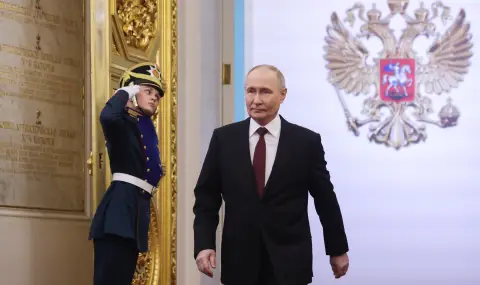Several influential Western media outlets have written in recent days that the US has handed over to Kiev and its European allies proposals for a ceasefire in the war against Ukraine. If the journalists' sources are to be believed, Washington's plan envisages official recognition of Russian control over the annexed Ukrainian peninsula of Crimea. The initiative was first reported by Bloomberg, and then the news was confirmed by CNN, the Washington Post and the Wall Street Journal.
Confidential document on the status of Crimea
The publications make it clear that during a recent meeting in Paris, American officials handed over to Kiev a confidential document with a package of US proposals for a cessation of hostilities. One of the key points in it is probably the recognition that Crimea, annexed by Moscow in 2014, is Russian. Now the US was waiting for the Ukrainian side's response.
Meanwhile, at the beginning of the week, journalists sought the opinion of the US president regarding the recognition of Crimea as Russian territory. Donald Trump did not confirm, but did not deny the information in the press. "I will tell you the details in the next three days. But we had very good meetings," he said in his usual style.
Ukraine's reaction
In the 11 years that have passed since the annexation of the peninsula, the media has repeatedly speculated on the topic. This time, officials in Kiev were in no hurry to comment. In front of “Radio Liberty” The head of the Mejlis of the Crimean Tatars, Refat Chubarov, suggested that through this type of message, the Trump administration is "testing the leadership of Ukraine, making "partenki" on the issue of territorial concessions from Ukraine, without which the end of the war and the establishment of a sustainable peace will not be possible."
In Kiev, presidential adviser Serhiy Leshchenko assured that during the negotiations with the United States, the Ukrainian delegation did not discuss the recognition of Crimea and did not agree to it.
President Zelensky, in turn, apparently wanted to put an end to the discussion and stated that Ukraine would not agree to the recognition of the occupation of the Autonomous Republic of Crimea. "We cannot discuss Crimea. Ukraine does not legally recognize the occupation of Crimea - this is outside our constitution. This is our territory, the territory of the people of Ukraine. This will not happen," Zelensky stressed.
What are the risks of recognizing the annexation of Crimea?
The American Robert Lansing Institute for the Study of Global Threats and the Study of Democracy has conducted a detailed analysis of the risks of recognizing the annexation of Crimea.
The scholars have identified three main threats to the international order. In general, they are convinced that recognizing the annexation of Crimea would represent a "seismic shift in US foreign policy and a break with decades of legal principles of protecting territorial integrity". Observers from the institute explain: First, recognizing the annexation of Crimea would be a strategic blow to the international legal order, as it undermines the principle of territorial integrity enshrined in international law and would weaken the legal order established after World War II. This could encourage other authoritarian states, such as China or Turkey, to engage in territorial revisionism.
Second, it would alienate allies in the Western camp: Ukraine would view such a step as a betrayal, and NATO and the EU, especially Western European countries, would view it as a capitulation to Russian aggression.
Third, there are consequences for US domestic policy. This step would provoke negative political reactions from both sides, and would also raise questions about Trump's true motivation, especially in connection with speculation about his possible long-standing ties with Moscow, which he himself, by the way, has always denied.
Either way, the researchers warn, this step would have major consequences and would seriously undermine trust in the United States in terms of upholding democracy and the rule of law around the world, especially in countries with authoritarian rulers.
"This would set a dangerous precedent"
Ukrainian political scientist Volodymyr Fesenko shares these opinions. He noted to DW that Crimea is a "red line and that this is absolutely unacceptable for Ukraine". Legal recognition of Crimea as Russian "would create a dangerous precedent not only for Ukraine, but for the entire world," Fesenko points out, recalling in this regard China's appetites for Taiwan.
Expert Andras Ratz of the German Foreign Policy Association also does not expect a quick diplomatic breakthrough. “It is not surprising that the Ukrainian side has rejected the US proposal, since it includes official recognition of the annexation of Crimea, the relinquishment of Ukrainian territory and de facto consent to Russia's occupation of the territories occupied since February 2022.”
Now observers are trying to guess what line Washington will choose. US Vice President J.D. Vance said on April 23 that both Ukraine and Russia would have to give up parts of the territory they currently control. According to Vance, the US has made a “very clear offer” to Russia and Ukraine. He warned that "the time has come for either Russia and Ukraine to say "yes" or for the US to withdraw from this process."
Author: Dmitry Kanevsky
